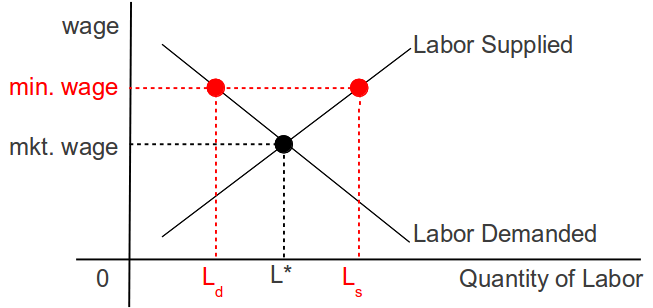Insidb said:
These are very good discussion points and further proof of the fact that policymakers fail to have constructive dialogues. I'll address your concerns and clarify, point-by-point:
1. I am lookign at all businesses in this way: any business that offers a service will be subjects to consumers' price sensitivity. If more consumers are more capitalized, this should increase the consumer base that finds the services offered to not trigger said sensitivities. By extension, this should also increase the willingness of current customers to increase their consumption. Take a diner that has lost business to McDonald's lower price model, for example: they should see a migration of customers to them that no longer fidn their prices to be prohibitive. Additionally, McDonald's should see their consumer base eat even more of their garbage lol. There will always be the business that has no potential for growth (for many reasons), and their prerogative should be to find a way to become competitive.
2. To clarify my verbatim, I'm talking about pure capitalization and being empowered with the ability to purchase goods and services. Inclusive of the poor, Americans are generally debtors and not averse to outspeding their income. As such, we should expect anyone making more money to spend more money: call us conditioned, but it's what we do. With greater capitalization, there comes the greater ability to pay off debts and, consequently, build credit, obtain loans, invest, etc. The propagative effects of that are significant, as I am sure you are well aware. Similarly, higher wages mean greater tax responsibilities and decreased welfare needs: there are additional propagative effects, as well.
3. Regional sensitivities are a huge issue that are often overlooked, especially with regards to taxation. The minimum wage is directly related to that, even though the same mechanics apply. The ever-present counter to "cost of living is so cheap there" is "they pay you shit there." Realistically speaking, unless there is a very specific logistical reason for reduced costs (local center of production), labor costs should be uniform. If an energy company doesn't have the demand to make the revenue to justify the labor expenditures, they shouldn't be producing so much there. The increases in unemployment would only make sense, if the employers are trying to maintain margins with the current revenue model. If a significant portion of your community is now more capitalized, your revenue model should account for this. Ultimately, bad businesses (vinyl record or film development stores, for example) will probably just fail faster. As far as migration of workers is concerned, it might make sense to expect the opposite: if you can't make a livable wage in suburbia, it makes sense to seek employment in the city. If the wages are competitive, there's no reason to leave there, especially since living costs will most likely be lower.
My intention is not to oversimplify the issue: that's for the politicians to do and lie about, but there is a lot of context that never gets addressed in these conversations. Most especially, you never really hear about how the DoL usually reports inflation at half of the actual rate and how companies often use 3% as the benchmark for a cost-of-living increase (which is always less than DoL inflation). Since healthy economies thrive on consumption, it makes sense to find ways to capitalize more people and have them consume. Overemphasis on profit margins is the reason the wage, tax rate, and income inequality conversations have all become so relevant: if money pools up in one place, the economy stagnates.
|
1. The issue is that in the short term the diner doesn't have the extra funds to employ all of their workers at the drastically higher rate. Let's say the diner is currently making revenue of $150,000 per year. $50,000 of that goes to the owner (this is what makes it worth it for the owner to run the business, otherwise they would work for somebody else.)
The rest is to be divided among capital costs: the taxes on the building, repairs to the building, food, and then to labor costs: a cook, two waitresses (assume the state requires minimum wage payments and the diner has no tips), a hostess, and a dishwasher. The cook makes $20,000 per year, the waitresses $14,000 per year each, the dishwasher $10,000 per year. That leaves $42,000 to costs of capital. Let's assume that the $42,000 is enough to maintain the building, buy food, etc for a year (it's a small diner.) Now let's say there is a 30% minimum wage increase for the following year, and capital costs are constant. That would mean ($20,000 + $28,000 + $10,000)*.3 = $17,400 is the increase. That also means the owner will have to take a pay cut of the same amount, only making $32,400. Knowing the stress of running a business would it be reasonable for the owner to keep running the business for $32,400 or could they use their skills elsewhere? What if the owner wasn't making a profit before the minimum wage hike? What if they were just getting by on $30,000? What if the owner employed many people? Would it not make more sense to just lay people off? What would happen to the quality of the service? How exactly would this affect demand for this small business owner if he or she lived in a low populated area?
But heck, we don't really have to speculate. Small business owners have already recognized this reality when they had to shut down their business after wage hikes.
Here is one example, but one can find plenty of other similar stories.
http://www.cbsnews.com/news/feeling-burned-by-a-15-minimum-wage/
"I hadn't done the math. I penciled it out and said, 'Oh my god, that's a lot of money,'" he recalled. "'I know other stores haven't done [the math]. You try to get through the day -- you aren't thinking three years ahead."
----------------------------------------------------------------------------------------------------------------------------------------------------------------------------------------------------------------------------------------------------------------------------------
2. Again, this is no different from the aggregate demand hypothesis. You are using an accounting term "capitalization" to describe what is essentially the economic concept of the effects of an increase in aggregate demand. Unfortunately, there is very little evidence, besides a single study in the 90's, when the labor market was at its peak in health, to show that minimum wage increases lead to increases in aggregate demand. I also don't buy that taxes will decrease. Governments, being the way they are, would just use the tax money on other pet projects. Furthermore, in places like Seattle there were actually people asking workers to reduce their hours so that they could remain on welfare, and also use more leisure time.
http://usherald.com/after-getting-15-minimum-wage-seattle-employees-now-want-less-hours-so-they-can-stay-on-welfare/
“Astoundingly” those who advocated for the increase in Seattle are now asking their employers for fewer hours so they can keep their welfare benefits."
----------------------------------------------------------------------------------------------------------------------------------------------------------------------------------------------------------------------------------------------------------------------------------
3. There are many factors besides labor costs which contribute to a cheaper cost of living. In the U.S: southern and rural mid-western states have lower costs of living because small population densities => lower housing prices, closer proximity to energy sources like coal and oil as well as agricultural sources => lower transportation and food costs, and fewer regulations overall increasing the cost of production. None of these have anything to do with labor costs. It is unrealistic to believe that labor costs should or would be uniform, especially in a federalist system with varying legal frameworks, as well as an overall diverse population of 315 million people. People in different regions have varying levels of productivity, and therefore the amount of money they can make for an employer varies. If wage levels were the same across the board, all this would do is push employers to places where productivity is higher, limiting the ability for persons who live in non-productive regions. The effect of this is that those with the fewest resources are stripped of any advantage they have left, and are either forced to migrate to already over-populated cities or remain in their economically stagnant position.
And I already illustrated that the increase in unemployment is an economic fact. It is one of the first things you learn in a microeconomics course.

It is also supported quite a bit empirically.
http://www.columbia.edu/~jm3364/Minimum_Wage_and_Space.pdf
Often, minimum wage laws are decided at the state or regional level, and even when not, federal level increases are only binding in certain states. This has been used in previous literature to evaluate the effects of minimum wages on earnings and employment levels. This paper introduces a spatial equilibrium model to think about the seemingly conflicting findings of this previous literature. The model shows that the introduction of minimum wages can lead to an increase or a decrease in population depending on the local labor demand elasticity and on how unemployment benefits are financed. The paper provides empirical evidence consistent with the model. On average, increases in minimum wages lead to increases in average wages and decreases in employment. The low-skilled local labor demand elasticity is estimated to be above 1, which in the model is a necessary condition for the migration responses found in the data. Low-skilled workers, who are presumably the target of the policy, tend to leave or avoid moving to the regions that increase minimum wages.
----------------------------------------------------------------------------------------------------------------------------------------------------------------------------------------------------------------------------------------------------------------------------------
As another thing to note. We even have predatory organizations trying to take advantage of minimum wage hikes by exempting themselves. In Californian cities, labor unions have been trying to force membership by becoming exceptions in minimum wage legislation specific so that their employees don't have to work at the minimum $15/hour, and consequently business are more likely to higher them. It is quite abhorent really, especially coming from an organization that is suppose to work for higher wages.
http://www.cnbc.com/2015/07/30/la-union-wants-to-be-exempt-from-15-minimum-wage.html
"In May, the Los Angeles City Council voted to lift the minimum wage to $15 an hour by 2020. As the council reconvenes this week after a summer recess, the group is expected to take action on a union-backed clause in the wage bill that would exempt unionized workers."

























































